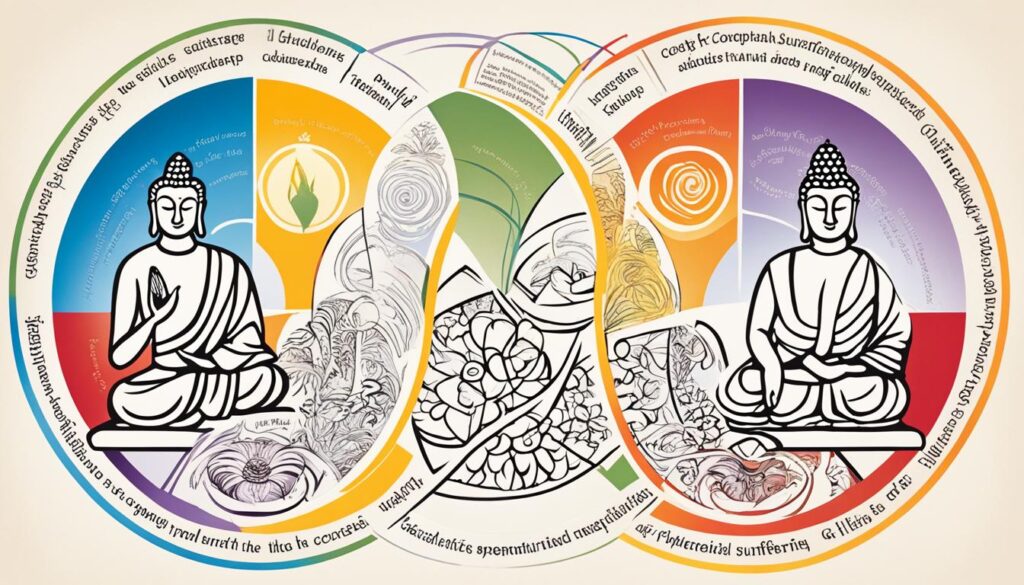Buddhism, the ancient spiritual tradition originating from the teachings of the enlightened Gautama Buddha, holds profound wisdom for finding inner peace amidst the chaos of the modern world. At its core, Buddhism focuses on understanding the nature of suffering and offering practical guidance on transcending it. As the Buddha once said, “Peace comes from within. Do not seek it without.”
By delving into the key beliefs of Buddhism, individuals can embark on a transformative journey towards inner peace and personal well-being. These beliefs provide a roadmap for cultivating mindfulness, compassion, and enlightenment, allowing us to navigate through the challenges of life with grace and equanimity.
Key Takeaways:
- Understanding the Four Noble Truths is crucial for recognizing the sources of suffering in life.
- The Eightfold Path offers a comprehensive guide for leading a virtuous and mindful life.
- Developing compassion towards others opens the door to inner peace and personal growth.
- Practicing mindfulness enables us to fully experience the present moment and find serenity within.
- Embracing impermanence and letting go of attachments brings freedom and liberation.
Understanding the Four Noble Truths in Buddhism
The Four Noble Truths serve as the foundational teachings of Buddhism, providing profound insights into the nature of human existence and a pathway to attain inner peace. These truths address the fundamental aspects of suffering, its causes, and the methods to overcome it.
-
The First Noble Truth: Suffering
The first noble truth acknowledges the inevitable presence of suffering or dukkha in life. It recognizes that human existence is plagued by mental dysfunctions, dissatisfaction, and various forms of pain. Whether it’s physical discomfort, emotional turmoil, or existential angst, suffering is an inherent part of the human experience.
-
The Second Noble Truth: Craving and Ignorance
Craving and ignorance are identified as the root causes of suffering. Craving refers to the insatiable attachment or desire for certain outcomes, objects, or experiences. Ignorance, on the other hand, is a lack of self-awareness and understanding of the true nature of reality. These mental afflictions contribute to a perpetual cycle of unsatisfactoriness.
-
The Third Noble Truth: Overcoming Suffering
The third noble truth offers hope and liberation. It asserts that suffering can be eliminated by overcoming craving and ignorance. By understanding the impermanent and interconnected nature of all phenomena, individuals can transcend their attachment to desires and attain liberation from suffering.
-
The Fourth Noble Truth: The Eightfold Path
The fourth noble truth presents the Eightfold Path as the way to suppress suffering and achieve inner peace. The Eightfold Path consists of a systematic and holistic approach to spiritual development, embracing eight interconnected principles. These principles include right understanding, right thought, right speech, right action, right livelihood, right effort, right mindfulness, and right concentration.
Understanding and embracing the Four Noble Truths is a transformative journey that enables individuals to develop greater self-awareness, transcend suffering, and cultivate inner peace. By letting go of craving, gaining wisdom, and following the Eightfold Path, one can embark on a path of spiritual growth and find solace in the midst of life’s challenges.

The Eightfold Path: A Path to Inner Peace
The Eightfold Path is the practical and systematic way to achieve inner peace according to Buddhism. It provides a holistic approach to personal transformation and serves as a guide for individuals seeking liberation from suffering.
Wisdom:
- Right View: Gain a deep understanding of the nature of reality and the interconnectedness of all beings.
- Right Intention: Cultivate wholesome intentions rooted in compassion, kindness, and non-harming.
Ethical Conduct:
- Right Speech: Communicate truthfully, kindly, and beneficially.
- Right Action: Act in ways that promote well-being and refrain from causing harm.
- Right Livelihood: Engage in work that aligns with ethical principles and contributes to the greater good.
Mental Cultivation:
- Right Effort: Cultivate wholesome qualities and overcome unwholesome tendencies through diligent practice.
- Right Mindfulness: Develop moment-to-moment awareness, observing thoughts, emotions, and sensations without judgment.
- Right Concentration: Train the mind through meditation to cultivate deep concentration and insight.
By following the Eightfold Path, individuals can develop a well-rounded practice encompassing wisdom, ethical conduct, and mental cultivation. This path enables practitioners to deepen their mindfulness, cultivate compassion, and navigate the challenges of life with equanimity and inner peace.

Cultivating Compassion for Inner Peace
In Buddhism, compassion is not just a virtue; it is a way of life that leads to inner peace and personal transformation. By developing empathy, forgiveness, and the willingness to help others, individuals can cultivate compassion and experience profound tranquility within themselves.
Compassion goes beyond feeling sympathy for others; it is about genuinely understanding and sharing in their suffering. When we practice compassion, we open our hearts to the pain and struggles of others, offering support, kindness, and understanding.
Empathy plays a crucial role in cultivating compassion. It is the ability to put yourself in someone else’s shoes, to understand their emotions and experiences. By empathizing with others, we build a strong connection that allows us to act with kindness and compassion.
In Buddhism, forgiveness is a powerful practice that supports the cultivation of compassion. By letting go of anger, resentment, and grudges, we free ourselves from suffering and create space for compassion to thrive. Forgiveness does not mean condoning or forgetting the harm done to us; rather, it is a conscious choice to release the pain and negative emotions associated with past experiences.
The Benefits of Cultivating Compassion
Cultivating compassion brings immense benefits to both ourselves and the world around us. When we practice compassion, we tap into our innate capacity for love and kindness, fostering positive relationships and harmony in our interactions with others.
Research has shown that compassion strengthens our social connections and enhances our overall well-being. It improves our emotional resilience, reduces stress, and promotes a sense of belonging and purpose.
Furthermore, practicing compassion towards others not only benefits them, but it also brings inner joy and peace to ourselves. When we engage in acts of compassion, we cultivate a sense of interconnectedness and expand our capacity for love, joy, and gratitude.
| Benefits of Cultivating Compassion | |
|---|---|
| 1 | Enhances emotional well-being |
| 2 | Reduces stress and anxiety |
| 3 | Improves relationships and fosters harmony |
| 4 | Strengthens empathy and understanding |
| 5 | Creates a sense of purpose and fulfillment |
Cultivating compassion is not always easy, and it requires dedicated practice and self-reflection. However, the benefits far outweigh the efforts involved. As we embrace compassion in our lives, we tap into our true nature of kindness, love, and interconnectedness, leading to a profound sense of inner peace and wellbeing.
Mindfulness for Present-Moment Awareness
Mindfulness is a fundamental practice in Buddhism that involves cultivating present-moment awareness. It encourages you to pay attention to your thoughts, emotions, and sensations without judgment. By being fully present in each moment, you can develop a deep sense of inner peace and clarity.
Meditation is a key tool for practicing mindfulness and training the mind to focus and observe without attachment or aversion. Through regular meditation practice, you can reduce stress, enhance self-awareness, and experience greater peace of mind.
The Benefits of Mindfulness
- Enhanced self-awareness: Mindfulness helps you become more aware of your thoughts, feelings, and bodily sensations, allowing you to better understand yourself.
- Reduced stress: By being present in the moment and letting go of worries about the past or future, mindfulness can help alleviate stress and promote relaxation.
- Improved focus and concentration: Mindfulness practice can enhance your ability to concentrate and stay focused on the task at hand, increasing productivity and efficiency.
- Emotional regulation: Being mindful allows you to observe your emotions without getting caught up in them, enabling you to respond to challenging situations with greater clarity and equanimity.
- Greater resilience: Mindfulness helps you develop a resilient mindset, enabling you to bounce back from setbacks and navigate difficulties with grace and composure.
To incorporate mindfulness into your daily life, set aside dedicated time for meditation practice. Start with a few minutes each day and gradually increase the duration as you become more comfortable. You can also incorporate mindfulness into everyday activities such as eating, walking, or even brushing your teeth. Focus on the present moment, engaging all your senses and cultivating a sense of curiosity and non-judgment.
Remember, mindfulness is a skill that requires practice and patience. With consistent effort, you can develop a greater sense of presence, awareness, and inner peace.

| Mindfulness Practices | Description |
|---|---|
| Body scan meditation | A practice that involves systematically focusing your attention on different parts of your body, noticing sensations without judgment. |
| Breathing meditation | Bringing attention to your breath, observing its natural rhythm and bringing your focus back whenever the mind wanders. |
| Walking meditation | Mindfully walking, paying attention to each step and the sensations in your feet and body as you move. |
| Loving-kindness meditation | Cultivating feelings of love, compassion, and goodwill towards yourself and others through the repetition of loving-kindness phrases. |
| Body scan meditation | A practice that involves systematically focusing your attention on different parts of your body, noticing sensations without judgment. |
Embracing Impermanence and Letting Go
In Buddhism, the concept of impermanence holds profound significance. It teaches us that everything in life is impermanent, constantly changing and evolving. This understanding can be liberating, helping us let go of attachments and find true freedom.
Attachment is a natural human tendency, a clinging to people, things, or outcomes that bring us comfort or pleasure. However, this attachment often leads to suffering. By recognizing the impermanence of all things, we can gradually release our attachments and embrace the transient nature of life.
Letting go is not about denying our desires or avoiding meaningful connections. It is about cultivating a sense of detachment that allows us to appreciate and engage with the present moment without getting caught up in expectations or clinging to outcomes.
When we let go of attachment, we free ourselves from the burden of constantly seeking happiness outside of ourselves. We can find liberation in accepting the ebb and flow of life, embracing the beauty and imperfection of each moment.

Embracing Impermanence in Daily Life
Practicing impermanence requires a shift in mindset and a deliberate cultivation of awareness. Here are a few ways to embrace impermanence and let go:
- Cultivate mindfulness: By being fully present in each moment, we can develop an understanding of the impermanent nature of our thoughts, feelings, and sensations. Mindfulness practices, such as meditation, can help us observe these transient experiences without attachment or aversion.
- Appreciate the beauty of impermanence: Instead of mourning the passing of a pleasant experience or clinging to it, we can learn to appreciate its fleeting nature. By savoring each moment, we can find joy in the present without the need for it to last forever.
- Let go of expectations: Often, our suffering arises from expectations that things will remain the same or unfold according to our desires. By releasing these expectations and embracing the uncertainty of life, we can open ourselves up to new possibilities and experiences.
- Nurture gratitude: Cultivating gratitude for what we have in the present moment can help us let go of the constant craving for something different or better. Recognizing the impermanence of all things reminds us to cherish the present and find contentment in what we already have.
Embracing impermanence and letting go is an ongoing practice that can lead to a greater sense of peace, freedom, and liberation. By releasing attachments and cultivating an acceptance of life’s ever-changing nature, we can find deep inner tranquility amidst the ebb and flow of existence.
Conclusion
Buddhism offers profound wisdom and teachings that can guide individuals towards attaining inner peace and personal well-being. By embracing the key beliefs in Buddhism, including the Four Noble Truths, the Eightfold Path, compassion, mindfulness, and acceptance of impermanence, you can embark on a transformative journey towards harmony and tranquility.
The Four Noble Truths shed light on the nature of suffering, the causes of suffering, and the path to liberation from suffering. Through the practice of mindfulness and compassion, you can cultivate self-awareness, overcome attachment and ignorance, and alleviate mental dysfunction.
The Eightfold Path provides a systematic approach to navigate life’s challenges and cultivate inner peace. By aligning your thoughts, words, and actions with principles such as right view, right intention, right speech, right action, right livelihood, right effort, right mindfulness, and right concentration, you can foster greater harmony within yourself and in your relationships.
By embracing compassion towards others and practicing forgiveness, you not only benefit those around you, but also experience a deep sense of inner peace and contentment. Mindfulness, through the practice of present-moment awareness and meditation, allows you to develop clarity, reduce stress, and foster a profound connection with the present.
Finally, by accepting the impermanence of life and letting go of attachments, you can find liberation and freedom from the entanglements that cause suffering. Buddhism’s teachings offer a transformative path that can lead to personal growth, inner peace, and contribute to the creation of a more compassionate and peaceful world.
FAQ
What are the key beliefs in Buddhism?
The key beliefs in Buddhism include the Four Noble Truths, the Eightfold Path, compassion, mindfulness, and acceptance of impermanence.
What are the Four Noble Truths in Buddhism?
The Four Noble Truths in Buddhism are: the recognition of suffering in life, the identification of craving and ignorance as the root causes of suffering, the understanding that suffering can be eliminated by overcoming craving and ignorance, and the guidance provided by the Eightfold Path to attain inner peace.
What is the Eightfold Path?
The Eightfold Path is a practical and systematic way to achieve inner peace in Buddhism. It consists of three categories: wisdom, ethical conduct, and mental cultivation. The path includes aspects such as right view, right intention, right speech, right action, right livelihood, right effort, right mindfulness, and right concentration.
How can compassion contribute to inner peace?
Compassion involves feeling genuine empathy and concern for the suffering of others. By practicing compassion, individuals not only benefit others but also find happiness and inner peace within themselves. Cultivating compassion involves developing empathy, forgiveness, and a willingness to help others.
What is mindfulness and how does it relate to inner peace?
Mindfulness is a core practice in Buddhism that involves cultivating present-moment awareness. By paying attention to one’s thoughts, emotions, and sensations without judgment, individuals can develop a deep sense of inner peace and clarity. Mindfulness is often practiced through meditation and helps reduce stress, enhance self-awareness, and promote peace of mind.
How does Buddhism view impermanence?
Buddhism teaches that everything in life is impermanent. By recognizing and accepting impermanence, individuals can let go of attachments and cultivate a sense of freedom. Letting go of attachments to desires, expectations, and outcomes can lead to greater peace of mind and a sense of inner freedom.

